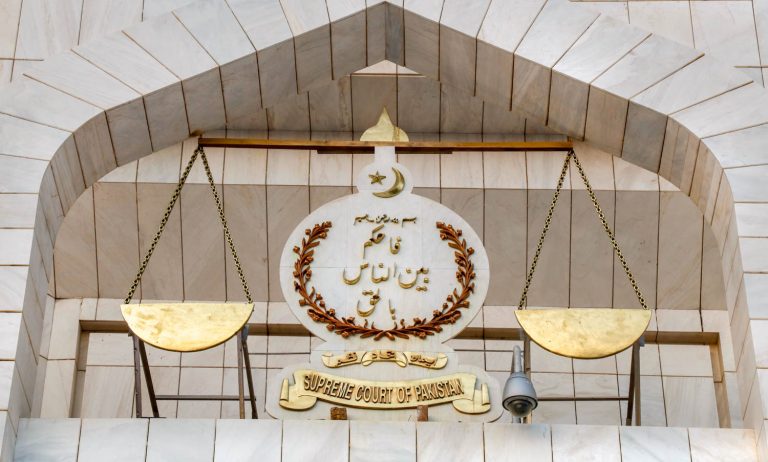Volcanoes are erupting in The Philippines, but on-fire Australia received some welcome rain. The Iran war cries have been called off and The Donald’s military powers are about to be hamstrung by the Senate. Meanwhile, his impeachment trial is starting, and we’re all on Twitter for a front-row seat.
Justice Ayesha A. Malik Is Justice for Pakistan’s Women
Pakistan has a sitting female Supreme Court judge for the first time in history. It is a win for more than the judiciary.

Swathed in black robes against a backdrop of carved wood and pale marble, two figures read out an oath at the Supreme Court in Islamabad, Pakistan—one administering, the other following suit. The slow drawl of their voices echoed through the chambers, punctuated only by the flicker of camera flashes.
But listen closely, and you would have heard the sound of glass ceilings being shattered, too.
In a Pakistan still recovering from 2021’s slew of gruesome misogynistic crimes and accompanying activism, this time, justice wasn’t being sought for a woman.
A woman was serving justice instead.
On January 24, 2022, 55-year-old Justice Ayesha A. Malik was sworn in as a Supreme Court judge, the first woman in Pakistan’s 75-year history ever to be elevated to its apex court. (Pakistan is also the only South Asian country to have never had a female Supreme Court judge.) Her appointment is more than a story of one woman’s individual success, however. In elevating Justice Malik, so too, has Pakistan elevated traditional but harmful attitudes around women to the scrutiny of the nation’s highest legal power.
“We are way behind in giving half our population its due space, and Justice Malik’s presence on the highest judicial bench will bring a welcome shift,” says Aamra Tariq, assistant professor at the Hamdard School of Law in Karachi, Pakistan.
On paper, Pakistan’s laws affirm gender equality. Its constitution forbids discrimination on the basis of sex and upholds the full participation of women in all spheres of national life. And yet representation of Pakistani women in law rests at a paltry 15%; for higher courts, that figure plummets to 5%, says Nida Usman Chaudhary, founder of the Pakistan’s Women in Law Initiative, in a video by TCM, Pakistan’s first digital news platform. (The Human Rights Commission of Pakistan places those figures at 17 and 4.4%, respectively.)
Even when women do enter the legal profession, they face systemic barriers that prevent their career ascension, explains Chaudhary. Female lawyers often log long hours behind the scenes doing case prepwork, without the opportunity to appear in court. This stymies their ability to meet the seniority requirements for nomination to the Supreme Court or Pakistan Bar Council, the highest elected body of lawyers.
In Justice Malik’s case, her education at Pakistan College of Law and Harvard University—where she was recognized for academic excellence—was followed by a robust legal career including two decades of service as a justice at the Lahore High Court. In other words, her breadth of experience hit all the right notes. But when it came to being elevated to the Supreme Court, Justice Malik faced a deeply patriarchal setting with few female allies: the process for Supreme Court judges is initiated by nominations—not applications—from the chief justice of the High Court, which are submitted to a nine-member, currently all-male judicial commission for a majority vote.
“Women have, in the past, been blocked from becoming chief justices of their respective high courts, and the fact that we did not have a single woman in the Supreme Court until now illustrates that there is indeed deep-rooted misogyny in the legal fraternity,” Islamabad-based lawyer Imaan Mazari-Hazir told The Guardian.
So despite meeting constitutional criteria for appointing Supreme Court judges, Justice Malik’s ascension was not smooth. She was fourth in line according to the seniority principle—an oft-referred to reasoning in Pakistan for nomination, though it is not a requirement—leading some to argue she jumped the queue. In fact, the Judicial Commission denied her elevation on those grounds in 2021 due to a lack of consensus. Even this year, the results were close: five to four.
While the public response to her elevation has been overwhelmingly positive, some lawyer’s groups threatened to go on strike in protest because they believed the seniority principle had been breached. It seemed a pretense, however. According to an op-ed written in 2021 by lawyer Dr. Zia Ullah Ranjah, when Justice Malik was first passed over, 41 judges have been promoted to the Supreme Court, bypassing other, more senior judges, in the past. Those judges were, of course, not women.
But even the controversy surrounding Justice Malik’s elevation opened pathways for important conversations, cultivating discourse about whether justices should be elevated on the basis of seniority or merit. It’s what assistant professor Tariq calls “a welcome debate,” both in everyday conversation, as well as in a formal judges’ elevation debate hosted by the Lahore High Court in August 2021.
It also allowed mindful reflection on female representation as more than a “tick-the-boxes” approach, instead reimagining it as a pursuit to ensure that the Supreme Court reflects the nation’s ideology and accounts for a multiplicity of perspectives.
The stakes are too high not to.
“Since inception, Pakistan has lacked the female narrative and voice in the superior courts,” says lawyer and associate professor of law Farah Khan Yousufzai Khan, which leads to a lack of consideration and a sometimes callous understanding of women’s rights and experiences. Many female survivors of sexual assault in Pakistan fear victim-shaming and avoid seeking justice.
“Maybe that [lack] is the reason that in 2022, judges are still using derogatory terms such as ‘women of shallow character,’ and ‘women of easy virtue,’ and [there is] constant victim shaming in cases of sexual assault and abuse,” Khan continues.
Malik is now poised to make headway on these issues, as she has before in other courts.
One year ago, for example, she directed federal and judicial governments to discontinue the archaic two-finger virginity test, wherein two fingers are inserted in the vagina to determine if the hymen is intact, with the results sometimes swaying the legal proceedings against a sexual assault survivor. Justice Malik declared the test unconstitutional. While it was outlawed as a result, reports from the ground indicate it is still being performed unlawfully.
Still, “Her contribution to the landmark decision outlawing the invasive and medically discredited virginity test on women who report rape or sexual assault, stating that the practice is discriminatory and ‘offends the dignity of the female victim,’ is a vital step in accessing justice for female survivors of violence,” said women’s rights and gender equality consultant Kanwal Ahluwalia.
Now, only one month into her service on the Supreme Court, Justice Malik is tackling entrenched beliefs around marital rape, an especially pertinent issue in Pakistan, one of around 30 nations worldwide that still hasn’t criminalized it. While Pakistan implicitly criminalizes marital rape through a Pakistan Penal Code amendment made in 2006, experts and research studies maintain there are still legal loopholes and ambiguity surrounding the language of what is and is not deemed marital rape in Pakistan. It’s also an especially murky area culturally, as many Pakistanis consider marital rape an oxymoron.
Justice Malik made the news earlier this month when a rape suspect’s counsel tried presenting the evidence that the complainant had gotten married to the defendant. Justice Malik reportedly asked, “So is marriage a license to rape?”
Landmark rulings and heavily publicized cases aside, though, perhaps the most dramatic outcome of Justice Malik’s elevation will be in the little things. In those mundane moments between milestones, where women will be able to see themselves reflected, represented, and heard.
That has, after all, been the driving impetus behind her work for years, such as advocating for gender sensitivity training for the courtroom and supporting special domestic violence courts that did not previously exist. (The former was inspired by her own experience at the Lahore High Court, where she says male counterparts initially didn’t know how to respond to her because they weren’t used to seeing women in such positions.)
She also continues to campaign for more inclusive vocabulary within the courtroom. She opposed, for instance, the widespread practice of judges referring to each other as “brother judges,” and has encouraged others to make space for women physically while standing in the courtroom, as they would for their mothers or sisters in a crowded place.
“I’ve become a voice,” she said in a 2021 interview with the United Nations Office on Drugs and Crime, “I’m there to call out the discrimination . . . I’m the voice that nudges, reminds, and suggests ways to improve ourselves and make our system more inclusive.”
Hers “is the voice Pakistan has needed for a very long time,” says lawyer Khan.
And while, as equality consultant Ahluwalia says, “Justice Malik is likely to be a small—though loud—voice in a highly discriminatory system,” it is no small thing for a woman to be part of the creation, or recreation, of that system from the top.
“Whether [women] come to the courtroom, whether they are in their homes, whether they are in the shelters, they need to be given their space . . . They need to know there is an entire system behind them. A system that they can count on . . . And a system that will ensure that justice is always served to them,” Justice Malik said during a 2018 Violence Against Women Conference.
Four years later, she seems to have paved the way to create that space, for her, and hopefully many others after.
Because on January 24, 2022, when the then- Chief Justice of Pakistan Gulzar Ahmed began administering the oath, there was finally a chance, for the first time in Pakistan’s history, to fill the quiet blank after the pronoun “I” with a female name—and with it, female ambitions, hopes, and dreams.
“Bismillah Hir Rahman Nir Rahim” (In the name of Allah, the most Merciful and Compassionate) . . .”
“Bismillah Hir Rahman Nir Rahim . . .”
“I . . .”
“I, Ayesha A. Malik . . .”


